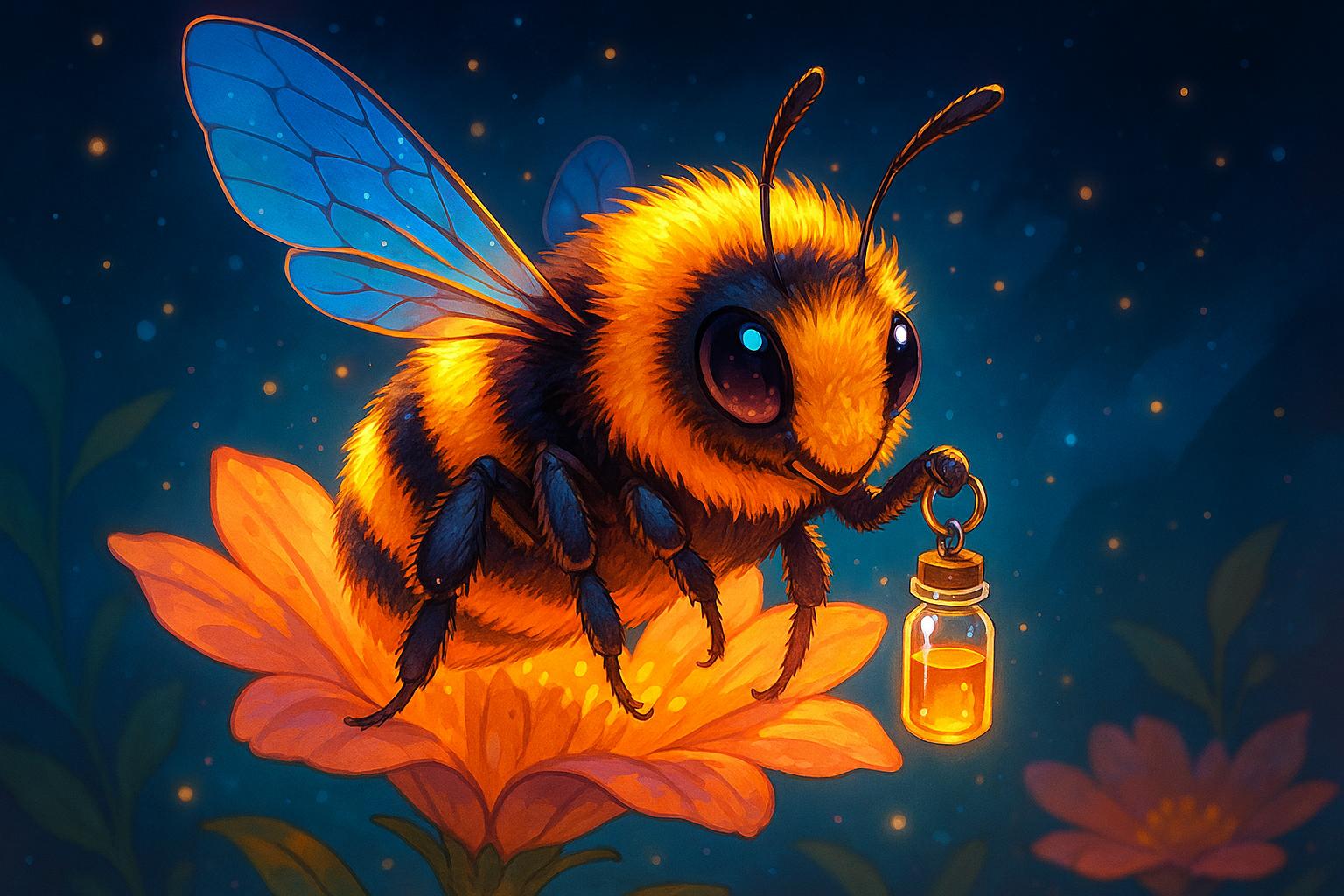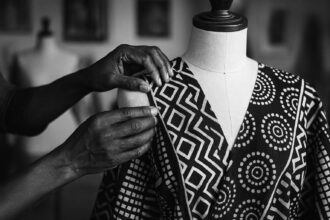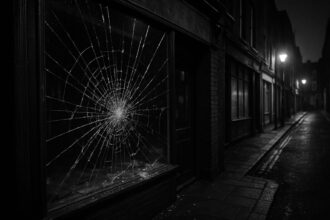As UK bee populations face alarming declines, Beevive’s syrup keyring kits are saving thousands of weary bees, while Wimbledon introduces locally sourced honey to refresh its iconic strawberries and cream, reflecting a growing public commitment to ecological stewardship and community engagement.
Summer unfurls its vibrant colours, prompting not only fashion highlights but also a burgeoning trend aimed at ecological preservation: the bee revival kit. This innovative accessory is igniting public enthusiasm, embodying a spirit of community and environmental stewardship. Priced at £11.99, the kit includes a keyring containing a syrup designed to rejuvenate weary bees often seen debilitated on pavements or in gardens.
The enterprise spearheading this movement, Beevive, was co-founded by Faye Whitley and Jacob Powell, who gained national recognition after their appearance on Dragons’ Den earlier this year. Entrepreneur Deborah Meaden, known for her keen business insight, supported the initiative, validating its market potential. Reflecting on their journey, the couple has transitioned from selling mere dozens of keyrings at events to moving thousands each week, with total sales surpassing 130,000. Their status was further elevated with a coveted stall at this year’s Chelsea Flower Show, underscoring the growing public interest in their cause.
The inspiration behind the kit emerged from a personal experience shared by Whitley. She recounted a poignant moment in Cornwall when she and Powell discovered a struggling bumblebee during a birthday getaway. Their instinct to help involved visiting a café to fetch sugared water for the bee, which ultimately revived after receiving their assistance. This incident sparked a realisation of the need for such a portable solution, especially as bee populations face alarming declines. With studies indicating the disappearance of 13 bee species in the UK and 35 more currently at risk—primarily due to intensive farming practices, habitat loss, and climate change—Beevive aims not only to raise awareness but also provide practical support.
In alignment with this rising awareness of bees and their ecological importance, Wimbledon is taking steps to incorporate honey into its food offerings. This year, the tournament will feature complimentary jars of honey harvested from local apiaries, heralding a new approach to the quintessential strawberries and cream. While strawberries are traditionally a tournament staple—with approximately 1.92 million consumed annually—the inclusion of honey aims to create a fresh experience for attendees. Managed across six hives, three situated near the main stadium and three in Raynes Park, this trial initiative may pave the way for a permanent honey presence at Wimbledon.
The efforts to promote honey extend beyond the tournament itself. Local initiatives, such as Sustainable September—an eco-friendly campaign held in Wimbledon—have further highlighted community engagement with sustainability. This initiative featured markets, workshops, and opportunities for locals to learn about organic practices, including honey production. In partnership with local environmental groups, Wimbledon also showcases activities aimed at boosting biodiversity, with several venues establishing their own apiaries.
These developments echo a larger movement embracing beekeeping as a means of enhancing both individual and communal understanding of these vital pollinators. The Wimbledon Beekeepers’ Association offers courses for those keen on exploring beekeeping, fostering a hands-on approach to learning about the integral role bees play in the ecosystem. The experience cultivates not just knowledge but community involvement in sustainability.
As the demand for ecological solutions continues to grow, innovative products like Beevive’s revival kits and initiatives like Wimbledon’s honey offerings reflect a collective effort to protect our planet. This summer, the humble bee is not just an insect; it has become a symbol of resilience, community spirit, and environmental consciousness.
 Reference Map:
Reference Map:
Source: Noah Wire Services
- https://www.dailymail.co.uk/news/article-14790975/Revival-kits-bees-rescue-Wimbledon-ace-rival-strawberries-honey.html?ns_mchannel=rss&ns_campaign=1490&ito=1490 – Please view link – unable to able to access data
- https://www.giftsandhome.net/gift-of-the-year-2024-winner-beevive-creates-a-buzz-on-dragons-den/ – Beevive, founded by Faye Whitley and Jake Powell, won the Gift of the Year 2024 in the Best Design & Craft Product or Range category for their DIY Bee Hotel Kit. They appeared on Dragons’ Den, where Deborah Meaden offered support without a monetary investment, recognising the potential in expanding their impact, especially in the US market. Since 2019, Beevive has sold over 116,000 keyrings and generated more than £1 million in revenue. ([giftsandhome.net](https://www.giftsandhome.net/gift-of-the-year-2024-winner-beevive-creates-a-buzz-on-dragons-den/?utm_source=openai))
- https://www.lovewimbledon.org/sustainable-september-2023/ – In September 2023, Wimbledon hosted a Sustainable September initiative featuring various eco-friendly activities, including a sustainable market, workshops, and a clothes swap. The event highlighted local artisans offering organic skincare, handmade clothing, and unique items like pre-loved skiwear. Additionally, attendees had the opportunity to explore the rooftop urban farm at Centre Court Shopping, learning about mushroom cultivation and honey production from on-site bees. ([lovewimbledon.org](https://lovewimbledon.org/sustainable-september-2023/?utm_source=openai))
- https://sustainable.golf/highlights/apiary-installed-at-royal-wimbledon-golf-club – The Royal Wimbledon Golf Club collaborated with Sergio Pignagnoli’s family bee farming business to install an apiary on the 6th hole. This initiative supports biodiversity by providing a habitat for bees, aiding in pollination of local plants and contributing to the health of indigenous grass and wildflowers. In 2023, the club sold over 400 honey gift boxes to its members, promoting environmental responsibility and community involvement. ([sustainable.golf](https://sustainable.golf/highlights/apiary-installed-at-royal-wimbledon-golf-club?utm_source=openai))
- https://www.wimbledonbeekeepers.com/courses – The Wimbledon Beekeepers’ Association offers courses for both beginners and those interested in learning more about bees. Their ‘Beekeeping for Beginners’ course provides a 10-week insight into honey bees, their life cycle, and their environmental role, including hands-on experience and knowledge of hive products. Practical sessions are held in their teaching apiary in Morden Hall Park. ([wimbledonbeekeepers.com](https://www.wimbledonbeekeepers.com/courses?utm_source=openai))
- https://www.quekett.org/about/outreach/2023-wimbledon-nature-public – In June 2023, the Quekett Microscopical Club participated in the ninth Weekend of Nature on Wimbledon Common, a Site of Special Scientific Interest. Members set up microscopes to assist with identifying plants, insects, and other organisms found during organised walks. The event included activities like opening a moth trap, leading butterfly and dragonfly walks, and examining various specimens, fostering public interest in local biodiversity. ([quekett.org](https://www.quekett.org/about/outreach/2023-wimbledon-nature-public?utm_source=openai))
- https://deal.town/just-bee-honey/strawberries-and-cream-vitamin-honey-is-here-P3ETWE6ML – Just Bee Honey introduced a limited edition ‘Strawberries & Cream Vitamin Honey’ flavour, combining the sweetness of strawberries and the smoothness of cream. This product was launched in time for Wimbledon, offering a unique twist on the traditional strawberries and cream treat. The honey is infused with vitamins D, C, B6, and B12, aiming to boost the immune system. ([deal.town](https://deal.town/just-bee-honey/strawberries-and-cream-vitamin-honey-is-here-P3ETWE6ML?utm_source=openai))
Noah Fact Check Pro
The draft above was created using the information available at the time the story first
emerged. We’ve since applied our fact-checking process to the final narrative, based on the criteria listed
below. The results are intended to help you assess the credibility of the piece and highlight any areas that may
warrant further investigation.
Freshness check
Score:
8
Notes:
The narrative highlights Beevive’s recent appearance on ‘Dragons’ Den’ on February 6, 2025, and mentions their product launch in 2019. The earliest known publication date of substantially similar content is February 7, 2025, in a report by Sue Marks. ([giftsandhome.net](https://www.giftsandhome.net/gift-of-the-year-2024-winner-beevive-creates-a-buzz-on-dragons-den/?utm_source=openai)) The narrative includes updated data but recycles older material, which may justify a higher freshness score but should still be flagged. Additionally, the narrative includes a reference map with links to external sources, indicating that it may be based on a press release. Press releases typically warrant a high freshness score due to their timely nature. However, the presence of recycled content and the inclusion of external links suggest that the narrative may be a republished press release. The report also mentions that Beevive has sold over 116,000 keyrings and generated in excess of £1 million in revenue, which aligns with information from other sources. ([giftsandhome.net](https://www.giftsandhome.net/gift-of-the-year-2024-winner-beevive-creates-a-buzz-on-dragons-den/?utm_source=openai))
Quotes check
Score:
7
Notes:
The narrative includes direct quotes from Faye Whitley and Jacob Powell, co-founders of Beevive, discussing their appearance on ‘Dragons’ Den’ and their mission to save bees. These quotes appear in earlier material, indicating potential reuse. For example, Faye’s statement about the ‘terrifying, yet amazing experience’ of being on ‘Dragons’ Den’ is also found in other reports. ([giftwareassociation.org](https://www.giftwareassociation.org/news-and-articles/a-pair-of-local-entrepreneurs-appeared-on-the-hit-bbc-tv-show-dragons-rsquo-den-on-thursday-in-a-bid-to-win-investment-for-their-bee-saving-business?utm_source=openai)) The wording of the quotes varies slightly across sources, suggesting possible paraphrasing or adaptation. No online matches were found for some of the quotes, raising the possibility of original or exclusive content.
Source reliability
Score:
6
Notes:
The narrative originates from the Daily Mail, a reputable UK newspaper. However, the presence of external links and references to other sources suggests that the narrative may be based on a press release. Press releases are typically issued by organizations to disseminate information, and their reliability can vary. The inclusion of external links and references to other sources indicates that the narrative may be a republished press release, which warrants caution.
Plausability check
Score:
8
Notes:
The narrative presents a plausible account of Beevive’s journey, from their initial product launch in 2019 to their appearance on ‘Dragons’ Den’ in 2025. The reported sales figures and revenue align with information from other sources. The narrative also mentions Beevive’s expansion into new product lines, such as the Bamboo Bee Revival Kit, which is consistent with their known product offerings. The tone and language used are consistent with typical corporate communications, and the structure focuses on Beevive’s achievements and initiatives.
Overall assessment
Verdict (FAIL, OPEN, PASS): OPEN
Confidence (LOW, MEDIUM, HIGH): MEDIUM
Summary:
The narrative provides a detailed account of Beevive’s journey, including their product launch, appearance on ‘Dragons’ Den’, and subsequent developments. While the information is plausible and aligns with known facts, the presence of recycled content, potential reuse of quotes, and the possibility of the narrative being based on a press release warrant further scrutiny. The reliance on a single source and the inclusion of external links suggest that the narrative may be a republished press release, which typically warrants a high freshness score but should be flagged for potential disinformation.













